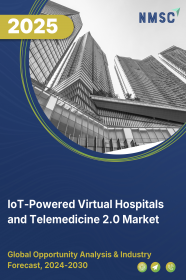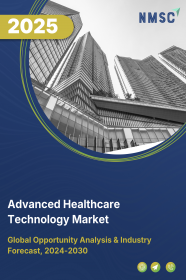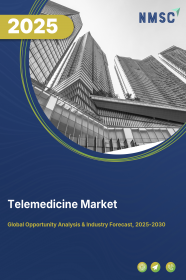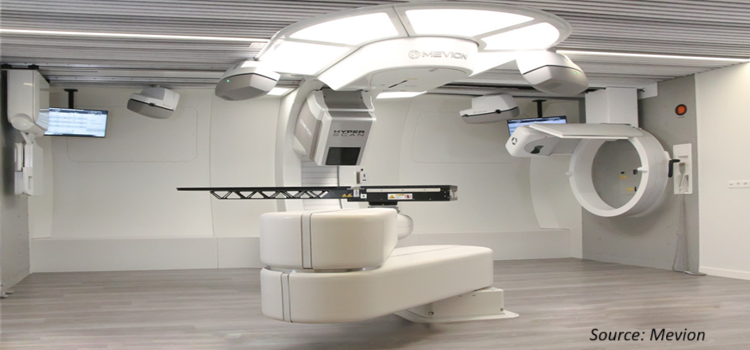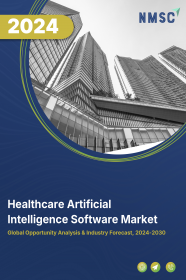
Healthcare Artificial Intelligence Software Market by Technology Type (Machine Learning (ML), Natural Language Processing (NLP), Deep Learning, Robotics, Computer Vision, and Expert Systems), by Applications (Medical Diagnosis, Drug Discovery, Robotic Surgery, Customer Service Chatbots, and Others), and by End-Users (Hospitals & Clinics, Pharmaceuticals & Biotechnology Companies, Research Institutions, and Healthcare Payers) - Global Opportunity Analysis and Industry Forecast 2024-2030
US Tariff Impact on Healthcare Artificial Intelligence Software Market
Trump Tariffs Are Reshaping Global Business
Healthcare Artificial Intelligence Software Market Overview
The global Healthcare Artificial Intelligence Software Market size was valued at USD 16.55 billion in 2023 and is predicted to reach USD 216.73 billion by 2030 with a CAGR of 43.1% from 2024-2030.
The healthcare artificial intelligence (AI) software market refers to the market that provides AI powered solutions to healthcare providers including hospitals and clinics, pharmaceuticals and biotechnology companies.
The medical AI software solutions are designed to enhance the clinical decision-making and improve patient care by offering advanced tools for medical diagnosis, drug discovery, and customer service chatbots.
In the field of drug discovery, AI accelerates research by analyzing vast datasets, reducing the time and expense associated with traditional methods. The healthcare AI software enables healthcare organizations to automate routine tasks, increase diagnostic accuracy, and personalize treatment plans that results in cost reductions and improves operational efficiency.
Several regulations are opted by government agencies such as Food and Drug Administration (FDA) and European Union (EU) to ensure the safe and effective use of AI in healthcare. Thus, the AI software in healthcare helps businesses harness data-driven insights to optimize performance and deliver better patient outcomes, making it an essential component in modern healthcare infrastructure.
Market Dynamics and Trends
The increasing expansion of healthcare services due to government investment drives the healthcare artificial intelligence software market demand. Governments worldwide are prioritizing healthcare infrastructure improvements that leads to the need for AI-driven technologies to enhance efficiency and patient care.
For instance, in April 2024, World Bank Group aims to expand health services to 1.5 billion people by 2030 that focusses on comprehensive care across all life stages. Subsequently, this rise in health services increases implementation of AI solutions to support advanced diagnostic tools and patient management systems.
Moreover, rising adoption of AI software for managing chronic diseases such as diabetes, cancer, and heart disease drives the demand for AI solutions as it facilitates early detection, enable personalized treatment plans, and support predictive analytics.
As per World Health Organisation (WHO) cancer cases is expected to increase over 35 million in 2050, a 77% increase from the estimated 20 million cases in 2022. Hence, the rise in such diseases highlights the role of AI software in transforming disease management, as it offers innovative solutions for early detection and personalizing treatments.
Also, growing advancements by major technology and healthcare giants such as Microsoft and IBM Watson Health drives market growth by expanding development of advanced AI solutions. For instance, in 2023, Microsoft introduced new data and AI solutions to enhance healthcare organizations capabilities.
This AI-powered diagnostics reveal valuable information from extensive healthcare data and enable functionalities such as natural language processing, sentiment analysis, and translation through APIs and customizable models. Consequently, these advancements are revolutionizing healthcare by enabling more advanced data analysis and improved decision-making capabilities.
However, high cost and limited access to resources make it difficult for small-scale enterprises including clinics, to adopt AI software that hampers the growth of the market. On the contrary, integration of AI with Internet of Things (IoT) in healthcare is expected to create ample growth opportunity for healthcare artificial intelligence software market trends in future.
The combination of AI and IoT helps to streamline hospital operations, improve patient outcomes and reduce healthcare costs by automating processes and enabling predictive care management.
For instance, in September 2024, Vodacom launched a range of innovative AI and IoT solutions to transform the healthcare delivery including the Extend Reality Glasses for telemedicine and the Smart PenSuite for data management. These innovations signify the promising future opportunities in harnessing advanced digital technologies within healthcare, paving the way for continued advancements in AI and IoT solutions.
Market Segmentations and Scope of the Study
The healthcare artificial intelligence software market report is segmented on the basis of technology type, applications, end-users and region. On the basis of technology type, the market is segmented into machine learning (ML), natural language processing (NLP), deep learning, robotics, computer vision, and expert Systems. On the basis of applications, the market is segmented into medical diagnosis, drug discovery, robotic surgery, customer service chatbots, and others. On the basis of end-user, the market is distributed into hospitals & clinics, pharmaceuticals & biotechnology companies, research institutions, and healthcare payers. The regional breakdown includes regions such as North America, Europe, Asia-Pacific, and the Rest of the World (RoW).
Geographical Analysis
North-America dominates the healthcare artificial intelligence software market share and is expected to continue its dominance during the forecast period. This is attributed to the increasing healthcare expenditure in the U.S. that drives healthcare providers to seek more efficient, cost-effective solutions accelerating the adoption of AI software.
According to Organization for Economic Co-operation and Development (OECD), the U.S. health spending rose from USD 12,196.97 in 2021 to USD 12,555.26 in 2022, reflecting a 3% increase in one year. This rise in healthcare expenditure boosts investment in AI software that enhance healthcare providers to improve efficiency, reduce operational costs, and improve patient outcome, fueling the healthcare artificial intelligence software market growth.
Moreover, growing adoption of various business strategies including partnership by leading companies such as CloudMedx Health and Nvidia Corporation is boosting the market growth in this region. For instance, in November 2022, Nuance Communications partnered with Nvidia Corporation to provide AI-based diagnostic tools to radiologists and clinicians. This type of collaboration improves patient care and reduce cost by integrating AI-powered insights that accelerates the adoption of AI in clinical settings and fuels the industry growth.
On the other hand, Asia-Pacific is the fastest growing region in the healthcare artificial intelligence software market driven by the rising aging population that fuels demand for advanced AI solutions.
According to the Pharmaceutical Resources Branch (PRB), Japan leads the world with the highest proportion of elderly individuals, comprising 28.2% of its population. Elderly population requires more frequent medical attention and long-term care, prompting the adoption of AI-powered tools to improve diagnostics and streamline patient data management. Thus, the high number of elderly populations in this region fuels the market as it helps in early detection of age-related diseases and facilitates continuous monitoring of health conditions.
Also, increasing incidence of cancer in this region is prompting healthcare systems to adopt AI-driven solutions to improve diagnosis treatment and patient management. According to Indian Council of Medical Research (ICMR), cancer cases in India is expected to rise from 26.7 million in 2021 to 29.8 million in 2025, projecting a 12% rise within the time span. Consequently, this surge in number creates need for AI software as it offers more accurate detection through advanced imaging analysis and pattern recognition in medical data.
Competitive Landscape
Various market players operating in the healthcare artificial intelligence software industry are Nvidia Corporation, Enlitic Inc., CloudMedx Health, Augmedix, GE Healthcare, Siemens Healthineers AG, Nuance Communications, Inc., Aidoc Medical, Paige AI, Inc., Komodo Health, Inc. and others. These companies continue to adopt various market development strategies such as partnerships and product launches to maintain their dominance in the sector.
For instance, in March 2024, GE Healthcare launched Prostate Volume Assist (PVA), an AI software feature to enhance urological imaging. The technology aims to improve efficiency for urologists and support precision care in treatment decisions. These innovations emphasizes the growing impact of AI-driven tools in enhancing diagnostic accuracy and provide more efficient patient care.
Furthermore, in June 2023, CloudMedx Health developed specialized large language models (LLMs) to address the challenges in application of artificial intelligence. This model is designed to operate within healthcare organizations to ensure patient data remains confidential and secure.
Therefore, the implementation of these healthcare data analytics tools enhance patient outcomes, streamline administrative task and reduce costs that allows providers to focus on patient care.
Also, in March 2023, Nvidia Corporation partnered with Medtronic to develop AI platform aimed to enhance medical devices with advanced AI technologies to improve accuracy and real-time decision making. Subsequently, such collaborations drive growth in healthcare artificial intelligence software market, prompting innovations and expanding product capabilities.
Key Benefits
-
The report provides quantitative analysis and estimations of the healthcare artificial intelligence software market from 2024 to 2030, which assists in identifying the prevailing industry opportunities.
-
The study comprises a deep-dive analysis of the current and future healthcare artificial intelligence software market trends to depict prevalent investment pockets in the industry.
-
Information related to key drivers, restraints, and opportunities and their impact on the market is provided in the report.
-
Competitive analysis of the players, along with their market share is provided in the report.
-
SWOT analysis and Porters Five Forces model is elaborated in the study.
-
Value chain analysis in the market study provides a clear picture of roles of stakeholders
Healthcare Artificial Intelligence Software Market Key Segments
By Technology Type
-
Machine Learning (ML)
-
Natural Language Processing (NLP)
-
Deep Learning
-
Robotics
-
Computer Vision
-
Expert Systems
By Applications
-
Medical Diagnosis
-
Drug Discovery
-
Robotic Surgery
-
Customer Service Chatbots
-
Others
By End-Users
-
Hospitals & Clinics
-
Pharmaceuticals & Biotechnology Companies
-
Research institutions
-
Healthcare payers
By Region
-
North America
-
The U.S.
-
Canada
-
Mexico
-
-
Europe
-
The UK
-
Germany
-
France
-
Italy
-
Spain
-
Denmark
-
Netherlands
-
Finland
-
Sweden
-
Norway
-
Russia
-
Rest of Europe
-
-
Asia-Pacific
-
China
-
Japan
-
India
-
South Korea
-
Australia
-
Indonesia
-
Singapore
-
Taiwan
-
Thailand
-
Rest of Asia-Pacific
-
-
RoW
-
Latin America
-
Middle East
-
Africa
-
Key Players
-
Nvidia Corporation
-
Enlitic Inc.
-
CloudMedx Health
-
Augmedix
-
GE Healthcare
-
Siemens Healthineers AG
-
Nuance Communications, Inc.
-
Aidoc Medical
-
Paige AI, Inc.
-
Komodo Health, Inc.
REPORT SCOPE AND SEGMENTATION:
|
Parameters |
Details |
|
Market Size in 2023 |
USD 16.55 Billion |
|
Revenue Forecast in 2030 |
USD 216.73 Billion |
|
Growth Rate |
CAGR of 43.1% from 2024 to 2030 |
|
Analysis Period |
2023–2030 |
|
Base Year Considered |
2023 |
|
Forecast Period |
2024–2030 |
|
Market Size Estimation |
Billion (USD) |
|
Growth Factors |
|
|
Countries Covered |
28 |
|
Companies Profiled |
10 |
|
Market Share |
Available for 10 companies |
|
Customization Scope |
Free customization (equivalent up to 80 working hours of analysts) after purchase. Addition or alteration to country, regional, and segment scope. |
|
Pricing and Purchase Options |
Avail customized purchase options to meet your exact research needs. |

















 Speak to Our Analyst
Speak to Our Analyst



